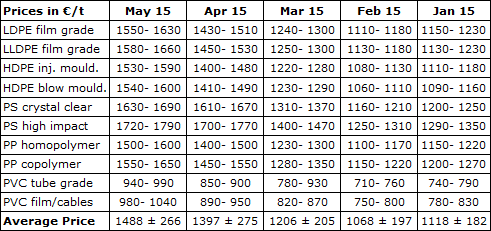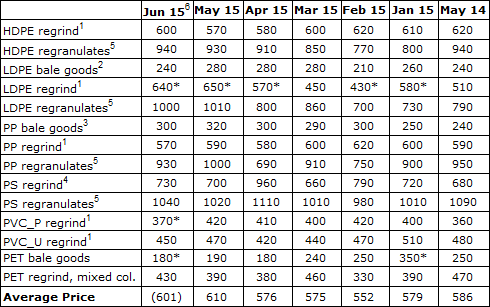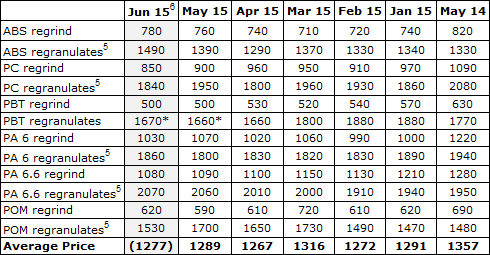Market Report Plastics - June 2015
Information about the market for plastics is being presented by:
bvse - Bundesverband Sekundärrohstoffe und Entsorgung e.V.
1. The market for primary plastics
In its annual statistics for 2014, Plastics Europe Germany, see www.plasticseurope.de, reported that plastics production had shrunk by 2.5 per cent - from 19.9 million tons in 2014 to 19.4 million tons in 2014. In the same year, turnover rose by 1%, reaching 27 billion. In 2014, 12.6 million tons of plastics were exported from Germany, while 8.8. million tons were imported. Approximately 35 % of plastics in Germany are used by the packaging sector, 24 % by the building sector, 10 % by the automotive industry and 6 % by the electrical and electronic equipment industry. Germany's plastics industry comprises 3,300 companies, 2,850 of which are involved in plastics processing. These plastics processors employ around 303,000 staff members, achieving a turnover of 58 billion.
Standard plastics: Even though the mineral oil price, which has averaged US-$ 60.5 per barrel over the past 100 days, is still very low, primary plastics prices have been continually rising since February. Since that time, standard plastics prices have increased by large gradations, i.e. by 138 /t, 191 /t and 91 /t each, see Table 1. For a detailed discussion, including information on price indices for virgin material prices and waste plastics as well as precursors, please refer to EUWID Recycling and Waste Management or EUWID Plastics, cf. www.euwid.de. However, the EUWID listings also show that there is no connection between the plastics price and the mineral oil price. This trend is also followed by petrol stations. Here, too, there is hardly any link between the mineral oil price and the petrol price. Only the developments in diesel prices seem to be linked more closely to the mineral oil price.
Standard plastics have continued to be in short supply in May and June. There is still not sufficient plant capacity, and the quantities of virgin materials available on the markets are very low. On the other hand, there is considerable demand for plastics. Did prices thus reach their peak levels in May? Probably not. However, standard plastics prices are likely to pick up again. Experts expect virgin material prices to rise once again in June and July. Packaging PET follows the general upward trend, attaining 1320 /t. In other words, its price has increased by an average 70 /t.
Table 1: Developments in standard plastics prices as published by EUWID over the past five months; prices quoted in /t.

2. The market for secondary plastics
Page 17 of the May edition published by Recycling International is titled 'Plastics recyclers fighting to stay alive'. Plastics recyclers are still suffering from the price slump in mineral oil, which has messed up the secondary plastics markets with a certain delay. From September 2014 to February 2015 plastics recyclers were faced with the most considerable market distortions. During this time, it was hardly possible to find a balance between the falling price listings for recyclates and the increasing price listings for processing input, i.e. waste plastics.
In addition to that, there was tremendous price pressure on recyclates, which posed an increasing threat because primary prices were steadily falling. These negative effects are still having an impact today.
Above and beyond this, there are considerable distortions in the secondary plastics markets: even though virgin material prices have been picking up since February, the prices of processing input, i.e. waste plastics, are still too high. The processing input available on the market, while being of poor quality, is much too expensive. Moreover, plastics recyclers are still fighting the outflow of processing goods to the Far East - or in other words: in large sectors of the plastics industry, recyclers are short of processing input of acceptable quality.
All that can be ensured is that plastics recyclates are selling well: on the one hand, this applies to recyclates, and on the other, to the products manufactured from them. Plastics recyclates are selling well in the market, not least due to the supply shortage in virgin materials. However, to date, it has not been possible to drive up the prices of recyclates to the same extent as those of virgin materials.
In May, the two indeces, i.e. EUWID and plasticker, showed rising prices. According to EUWID, price rises averaged 11 /t, while plasticker listed them at an average 34 /t. EUWID reported that waste plastics prices from post-user materials and production had increased. The price rises published by plasticker are, for the most part, due to the granulates that are listed in this index.
Evaluations of the foreign trade statistics for waste plastics have shown that the plastics quantities exported by Germany were markedly lower in the first quarter of 2015 (321,000 t) than in the first quarter of 2014 (370,800 t). On the other hand, the amount of plastics imported to Germany in the first quarter of 2015 equalled 91,352 t. Germany exports waste plastics, for a large part, to the Far East, especially to Malaysia (2 %), Hong Kong (16 %) and the People's Republic of China (48%). A large proportion of the statistically recorded exports of waste plastics to the Netherlands (7%) or to Belgium are ultimately destined for the Far East. In addition, export demand is rising considerably again - this development is also supported by the favourable euro-dollar exchange rate.
Finally, one should not be misled: throughout the whole year, Germany continues to export large amounts of waste plastics to the Far East, which then leads to the materials being in short supply in the German plastics recycling industry. It is also discernible that the quantity scenarios for plastics exports have not changed very much over the past few years.
2.1 EUWID Price Watch
From April to May prices rose from 10 /t to 30 /t for PE, PP and PS; only PVC held its own. Secondary plastics prices, which bottomed out in February 2015, have been continually rising over the past few months.
The listings for the following post-industrial PE grades have increased by 11 /t: HDPE mixed colours 550-670 /t, HDPE natural 650-800 /t, LDPE mixed colours 470-620 /t, LDPE natural 650-800 /t, LDPE film mixed colours (K49) 240-350 /t and LDPE film natural (K40) 530-620 /t. The following PE post-user prices have risen by 10 /t: LDPE shrink film natural (E 40) 520-560 /t, LDPE shrink film mixed colours (E 49) 230-320 /t, film transparent natural <70 m 430-490 /t, film transparent mixed colours <70 m 50-170 /t, LDPE farm film b/w > 70 m 60-110 /t, mixed film (90/10) 280-340 /t, mixed film (80/20) 240-310 /t, HDPE hollow bodies mixed colours (C 29) 260-390 /t, HDPE regrind from crates, colour-separated 670-850 /t und HDPE regrind from crates mixed colours 550-640 /t. In the export trade with the Far East, there is considerable demand for high-quality film in particular.
PP post-industrial prices have risen by an average 10 /t: Film mixed colours (K 59) 150-230 /t, film natural (K 50) 340-500 /t, homopolymer mixed colours 500-650 /t, homopolymer natural 650-800 /t, copolymer mixed colours 500-650 /t and copolymer natural 650-800 /t.
The PVC listings have remained unchanged. Since the beginning of spring, the PVC industry has been benefiting from the boom in the building industry, which uses windows and tubes from PVC in particular for construction purposes. The price rises discernible in the market were not yet listed by EUWID in May.
Along with PVC, PS is also benefiting from the building boom. The prices of post-industrial PS have climbed by an average 14 /t. The following prices were quoted in May: standard mixed colours 550-680 /t, standard crystal clear 660-880 /t, standard white 680-880 /t, high impact mixed colours 640-740 /t, high impact black 640-740 /t and high impact white 750-880 /t.
The listings for disposable PET beverage bottles follow the current market development. According to EUWID, too, PET prices have fallen markedly. The index provides a realistic representation of the current market situation. At last, there are sufficient quantities of processing goods at sufficient quality in the market. PET beverage bottles can be purchased both from Germany and from the European Single Market. Nevertheless, German recyclers are still losing large quantities of German returnable bottles to other countries. Recyclates, i.e. flakes and regranulates, are selling well. The following prices were listed for PET beverage bottles in May: PET transparent 150-165 /t und PET coloured 10-25 /t. In other words - depending on quality, coloured PET is now overcoming the barrier of incurring additional cost. However, PET processors are concerned that the price spiral for beverage bottles is moving upward much too fast.
2.2 plasticker price index
The plasticker internet platform, see http://plasticker.de, publishes quotes on an hourly basis. The present market report indicates the final monthly prices. It is only possible to represent the preliminary prices for June 2015. These listings thus merely reflect an interim situation that does not become definitive until July 2015. Plasticker offers the quality grades regrind and regranulates both as virgin materials and as secondary goods. The term 'bale goods' refers to waste plastics only.
Standard plastics
According to plasticker, standard plastics prices more or less held their own from January to April. The average price only went up by 34 /t from April to May. In May prices rose, for the most part, as a result of the increased virgin material prices, i.e. LDPE and PP regranulates in particular. In part, the prices of individual quality grades changes marketly. Thus, price rises ranged between a total of 10 /t and 210 /t and price falls between 10 /t and 260 /t. The listings for the PS quality grades - in this case regrind (- 260 /t and regranulates (-90 /t) - fell markedly! There was considerable demand for standard plastics in May. The prices of PET bale goods and PET regrind stabilised at a low level.
The first preview of the June listings, which cannot be definitively reported until the beginning of July, shows the average price to be 601 /t. On 15 June 2015, the plasticker internet platform thus indicated only slight price changes for June. To date, there has been good demand for standard plastics in June.
Table 2: Prices of standard plastics in plasticker, quoted in /t

*: Supply figures too low to attain statistical significance; 1: equivalent to the grade "post-industrial, mixed colours"; 2: equivalent to K49; 3: equivalent to K59; 4: equivalent to "standard, mixed colours"; 5: equivalent to the grade "regranulates, black", 6: preview (may be amended by additional quotes)
Technical plastics
Within the standard deviation of 19 /, the technical plastics prices listed by plasticker were largely stable from January to May. They fell by 68 /t in 2015 compared to the previous year. The listings for the individual quality grades changed only slightly: price rises ranged between 20 /t and 150 /t and price falls between 10 /t and 60 /t. There was sufficient demand for technical plastics in May. According to plasticker the following listings changed by more than +/- 70 /t in May: ABS regranulates +100 /t and PC regranulates +150 /t.
The first preview of the June listings, which cannot be definitively reported until the beginning of July, shows the average price to be 1277 /t. According to the plasticker internet platform, there was considerable demand for technical plastics until 15 June 2015.
Table 3: Prices of technical plastics in plasticker, quoted in /t

5: equivalent to the grade "regranulates, black", 6: preview (may be amended by additional quotes)
No guarantee for any of the prices. All EUWID prices are quoted ex works. As a rule, the prices quoted refer to quantities in excess of 20 tons. The monthly quotes for secondary plastics, which are updated on an hourly basis, can be calculated using the price lists that are derived from the quotations published in the raw material exchange plasticke. The prices listed in this index are quoted with reservation - as the majority of the quotes submitted are not necessarily equivalent to the sales prices. Furthermore, plasticker does not distinguish between the following grades: transparent, mixed colours or colour-separated. Therefore, the information provided by plasticker may indicate different market behaviour than the prices quoted by EUWID.









